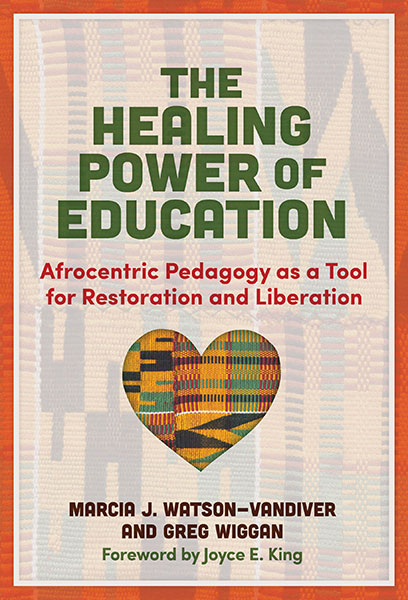Professors: Request an Exam Copy
Print copies available for US orders only. For orders outside the US, see our international distributors.
Marcia J. Watson-Vandiver, Greg Wiggan
Foreword by: Joyce E. King
Publication Date: April 23, 2021
Pages: 240

Situating the African American learning experience within the stream of historic enslavement and hundreds of years of institutionalized racism, this timely book introduces antiracist foundations for teaching in the 21st century. The authors take a holistic approach that uses Afrocentricity to identify and address critical omissions and distortions in school curricula. Drawing on empirical findings from a high-performing 100% African American school, they identify what teachers and students recognize as successful features of the schools’ approach, including a unique learning environment, support systems, spiritual affirmations, evidences of Black education, a reframing of Afrocentricity, and education that promotes positive Black identity. This much-needed book demonstrates the healing power of education; provides evidence of social, emotional, and psychological transformation within the learning experience; and frames education as a tool for liberation.
Book Features:
Marcia J. Watson-Vandiver is an assistant professor of education at Towson University. Greg Wiggan is professor of urban education at the University of North Carolina at Charlotte.
“This educational model is indispensable not only to heal Black students, but also for the health and wellness of everyone in this society—a society that is traumatized by the emotional and spiritual damage of dehumanizing racial domination. Marcia Watson-Vandiver and Greg Wiggan have given us a book that is liberating for us all.”
—From the Foreword by Joyce E. King, Benjamin E. Mays Endowed Chair for Urban Teaching, Learning & Leadership, Georgia State University
Contents (Tentative)
Foreword Joyce E. King vii
Preface ix
1. Introduction: Education as Healing 1
Consistently Underserved Students 7
Purpose 8
Central Questions 11
Definitions 12
Significance of the Work 16
A Closer Examination of Student Achievement 23
Summary 27
2. Social and Historical Context of Black Education 28
Pre-Colonial History 29
Precursors to Pan-Africanism 47
The Formation of Pan-Africanism 50
Black Nationalism 51
Pan-Africanism and Education 53
The Impact of Pan-Africanism and Black Nationalism 55
Pan-Africanism and Black Nationalism Today 56
Scientific Racism 57
Stories of Resistance: Warrior Queens 61
Afrocentricity in the 21st Century 69
Afrocentric Education 70
Summary 73
3. Overview of Afrocentric Schools in the 20th and 21st Centuries 74
Early Afrocentric School Models 75
Afrocentric Schools in the 1990s 76
21st-Century Afrocentric Schools 82
Afrocentric Curriculum in the 21st Century 84
Afrocentric Schools: Where Are We Now? 88
Status of Afrocentric Education Today 89
Summary 90
4. Asa G. Hilliard Academy 92
Asa G. Hilliard Academy 93
Participants 96
Themes 107
Summary 110
5. Teachers and Students’ Perceptions of Afrocentric Schools 111
Theme 1: Unique Environment: “This School Is Just Different” 112
Theme 2: Support System: “A Close-Knit Community” 121
Theme 3: Morning Devotion: “Spiritual Encouragement in an African Worldview” 127
Summary 132
6. Benefits of Afrocentric Schools in Addressing Historical and Contemporary Trauma 133
Theme 4: Black Education: “Every Day of the Year” 134
Theme 5: Reframing Afrocentricity: “Centering the African Child” 140
Theme 6: Restorative Education: “Promoting Positive Black Identity” 147
Summary 151
7. Education as Healing Power: Findings and Policy Recommendations 153
Theme 1: Unique Environment: “This School Is Just Different” 154
Theme 2: Support System: “A Close-Knit Community” 156
Theme 3: Morning Devotion: “Spiritual Encouragement in an African Worldview” 158
Theme 4: Black Education: “Every Day of the Year” 159
Theme 5: Reframing Afrocentricity: “Centering the African Child” 161
Theme 6: Restorative Education: “Promoting Positive Black Identity” 163
Implications of the Study 165
Limitations 167
Policy Recommendations 168
Summary 171
Appendix A: Teacher/Administrator Interview Protocol 1 174
Appendix B: Teacher/Administrator Interview Protocol 2 175
Appendix C: Student Interview Protocol 176
Appendix D: Student Written Essay Prompt 177
Appendix E: Afrocentric Learning Observation Rubric 177
Appendix F: Research Design Flow Chart 182
Appendix G: Daily Devotion (“The Seven Principles”) 183
Appendix H: Daily Devotion (“Nobility”) 184
Appendix I: Daily Devotion (“The Ultimate Student”) 185
Appendix J: Daily Devotion (“I Have the Power”) 186
Appendix K: Daily Devotion (“Can’t”) 186
Appendix L: Daily Devotion (“Lift Every Voice and Sing”) 187
Appendix M: Research Context 188
References 201
Index 217
About the Authors 228
Professors: Request an Exam Copy
Print copies available for US orders only. For orders outside the US, see our international distributors.